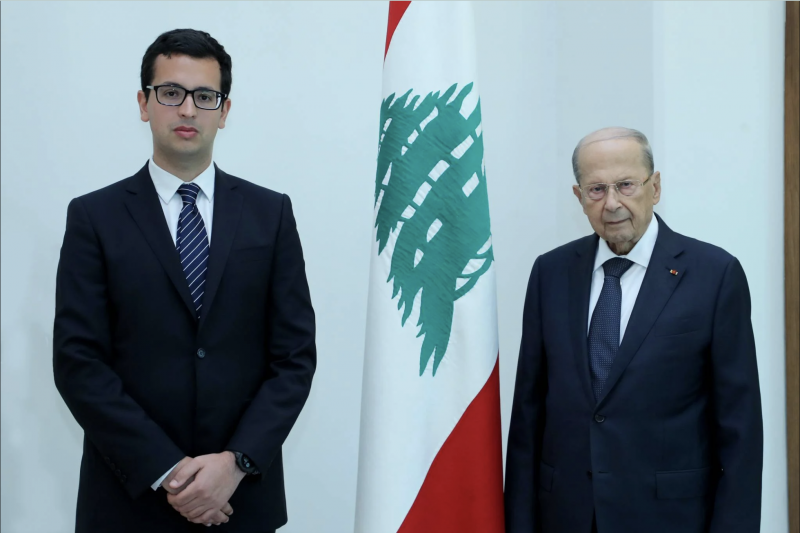
The Resident Representative of the International Monetary Fund in Lebanon, Frederico Lima, and the President, Michel Aoun, during an official meeting last June. (Dalati and Nohra)
The International Monetary Fund’s Resident Representative in Lebanon, Frederico Lima, commented on President Michel Aoun’s refusal to sign an amended version of Lebanon’s banking secrecy law, thus returning it to Parliament for a second reading.
Speaking to L’Orient-Le Jour on Monday, Lima the IMF “welcomed” authorities’ decision to reopen debate on law in an effort to “improve some key provisions.”
Lima’s comments offered the IMF’s first public opinion on the subject.
In a Staff-Level Agreement (SLA) signed on April 7, the IMF said it is ready to release a financial assistance package of $3 billion over four years if Lebanon enacts the first round of reforms, including amendments to the 1956 banking secrecy law.
Lebanon has been in a deep financial crisis since 2019. In March 2020, the county defaulted on its Eurobond debt payments.
Parliament approved the new version of the law at the end of July, but the IMF informed Lebanese authorities in a confidential missive that it was not satisfied with the draft’s content. The letter was leaked in early September, just after Baabda announced it had called on MPs for a second review.
In the missive, the IMF apparently identified four issues with the law passed by Parliament:
• The law does not expressly grant access to “banking information” to BDL, the Banking Control Commission (CCB) and the National Institute for the Guarantee of Deposits (NIGD). Rather, this access is granted only to the judicial authorities, the tax authorities, the Special Investigation Commission (SIC) and the National Commission for the Fight against Corruption.
• Under the law in its current form, banking secrecy may only be lifted in cases of prosecution for financial crimes, without providing for non-contentious administrative procedures, such as routine audits.
• The law should also provide “a mechanism for law enforcement access” to banking information, according to the IMF.
• Finally, the law includes excessively heavy prison sentences to punish those who “breach” banking secrecy, raising concerns that punitive measures are too dissuasive against potential whistleblowers.
Diplomatic tone
Lima explained that a reformed banking secrecy law would bring the legislation “in line with international best practices,” which he declared is “fundamental to fight corruption, eliminate impediments to effective banking sector restructuring and supervision.”
He also said he considered the reform an essential tool for tax administration, assets recovery and “the fight against financial crimes.”
Last week, Lima indirectly conveyed the same message during a meeting in Beirut with the chairman of the parliamentary Finance and Budget Committee, Ibrahim Kanaan.
“The tone is diplomatic, but the message is firm: the IMF considers the law passed ineffective and wants changes to be added,” said a financial expert who declined to be named.
According to the same expert, Aoun’s decision to not sign the law and send it back to the Parliament, as permitted by the Constitution, suggests prior coordination between the IMF and Aoun.
“What is certain is that the political class is no longer able to escape the radar,” the source said. If Parliament approves the law again, it will take effect even without Aoun’s signature.
Former Justice Minister Marie-Claude Najm said the banking secrecy law passed by Parliament at the end of July is different from the draft sent to her, which developed during a lengthy process the IMF had followed from a distance.
“A number of provisions incorporated during the plenary session weakened the law. It is essential to review them, because this law is the keystone of all the other reforms that must be conducted,” Najm told L’Orient-Le Jour on Monday.
She recalled that former Prime Minister Hassan Diab’s cabinet, which requested financial assistance from the IMF in 2020, approved an amended draft of the banking law in March that same year.
“This first draft [developed by Diab’s cabinet], which I worked on when I was at the Ministry of Justice, was never adopted by Parliament,” she said. She continued, “The ball is once again in the MPs court.”
At the constitutional level, nothing prevents MPs from re-voting on the law without adding additional amendments. The presidency cannot refuse to promulgate the law if Parliament approves it again without amendments.
IMF mission
Another meeting was scheduled Monday between the teams of the caretaker Finance Minister, former Banque du Liban executive Youssef Khalil and specialized experts dispatched by the IMF.
A statement by the Ministry of Finance indicated that Lebanon's caretaker Deputy Prime Minister Saade Chami, who heads the Lebanese team negotiating with the IMF, also participated in the meeting. The meeting reportedly focused on methods of promoting public revenues to “adapt them to the exchange rate changes” so as “to allow the state to provide basic public services” amid a sharp lira depreciation.
The timing of this meeting is crucial, given that Parliament is set to meet Wednesday to examine the 2022 draft budget law and decide, among other things, on the exchange rate that will be used to calculate several categories of revenues, particularly tax revenues.
The adoption of credible and balanced annual budget laws is one element of reforms Lebanon must implement to convince the IMF to release its aid package, which will fund a recovery process spanning over several years.
In return, Lebanon will have to reform its public sector, address losses in the financial system and prove it can fight corruption more effectively.
This article was originally published in French in L'Orient-Le Jour. Translation by Joelle el Khoury.